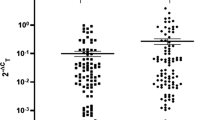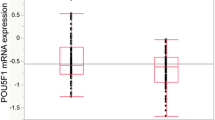Abstract
Colorectal cancer is the second leading cause of cancer-related death in the United States and the fourth leading cause worldwide. Currently, there is still no excellent predictor of the survival. Polycomb-group proteins Bmi1 is regarded as a “stemness” gene involved in the maintenance of stem cells, malignant transformation, and biologic aggressiveness of several human carcinomas. We examined the expression of the Bmi1 in colon cancer and its relevance to other characteristics, especially the 5-year survival of colon cancer. The expression of Bmi1 was examined in colorectal carcinoma (n = 98) by using real-time polymerase chain reaction. Expression was correlated with clinicopathologic variables, 5-year overall survival (OS) rates. We for the first time found that high expression of Bmi1 was significantly associated with poor survival. Fourfold Table Chi-square Test analysis revealed that Bmi1 expression was closely related to TNM stage and histologic grade, while not relevant to age. In summary, the high expression of polycomb-group protein Bmi1 is an essential and important predictor of colorectal cancer prognosis.

Similar content being viewed by others
References
Jemal A, Siegel R, Ward E, Murray T, Xu J, Thun MJ. Cancer statistics, 2007. CA Cancer J Clin. 2007;57:43–66.
van der Lugt NM, Domen J, Linders K, van Roon M, Robanus-Maandag E, te Riele H, et al. Posterior transformation, neurological abnormalities, and severe hematopoietic defects in mice with a targeted deletion of the bmi-1 proto-oncogene. Genes Dev. 1994;8:757–69.
Park IK, Morrison SJ, Clarke MF. Bmi1, stem cells, and senescence regulation. J Clin Invest. 2004;113:175–9.
Jacobs JJ, Kieboom K, Marino S, DePinho RA, van Lohuizen M. The oncogene and polycomb-group gene bmi-1 regulates cell proliferation and senescence through the ink4a locus. Nature. 1999;397(6715):164–8.
Ailles LE, Weissman IL. Cancer stem cells in solid tumors. Curr Opin Biotechnol. 2007;18(5):460–6.
Abdouh M, Facchino S, Chatoo W, Balasingam V, Ferreira J, Bernier G. BMI1 sustains human glioblastoma multiforme stem cell renewal. J Neurosci. 2009;29(28):8884–96.
Martínez-Romero C, Rooman I, Skoudy A, Guerra C, Molero X, González A, et al. The epigenetic regulators Bmi1 and Ring1B are differentially regulated in pancreatitis and pancreatic ductal adenocarcinoma. J Pathol. 2009;219(2):205–13.
Hoenerhoff MJ, Chu I, Barkan D, Liu ZY, Datta S, Dimri GP, et al. BMI1 cooperates with H-RAS to induce an aggressive breast cancer phenotype with brain metastases. Oncogene. 2009;28(34):3022–32.
Tateishi K, Ohta M, Kanai F, Guleng B, Tanaka Y, Asaoka Y, et al. Dysregulated expression of stem cell factor Bmi1 in precancerous lesions of the gastrointestinal tract. Clin Cancer Res. 2006;12(23):6960–6.
Chiba T, Miyagi S, Saraya A, Aoki R, Seki A, Morita Y, et al. The polycomb gene product BMI1 contributes to the maintenance of tumor-initiating side population cells in hepatocellular carcinoma. Cancer Res. 2008;68(19):7742–9.
Piscaglia AC. Stem cells, a two-edged sword: risks and potentials of regenerative medicine. World J Gastroenterol. 2008;14(27):4273–9.
Hong SP, Wen J, Bang S, Park S, Song SY. CD44-positive cells are responsible for gemcitabine resistance in pancreatic cancer cells. Int J Cancer. 2009;125(10):2323–31.
Acknowledgments
This study was funded by National Science Foundation of China NSFC: No.30471698.
Author information
Authors and Affiliations
Corresponding author
Rights and permissions
About this article
Cite this article
Du, J., Li, Y., Li, J. et al. Polycomb group protein Bmi1 expression in colon cancers predicts the survival. Med Oncol 27, 1273–1276 (2010). https://doi.org/10.1007/s12032-009-9373-y
Received:
Accepted:
Published:
Issue Date:
DOI: https://doi.org/10.1007/s12032-009-9373-y




